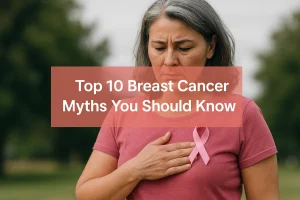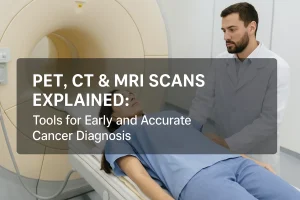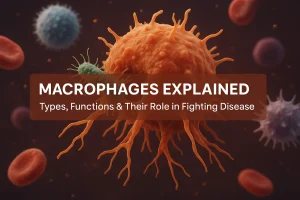
Cancer Symptoms in Men and Women: Early Warning Signs You Shouldn’t Ignore
Cancer refers to an abnormal condition in which our body cells divide uncontrollably, leading to a tumour-like outgrowth that sometimes becomes malignant (spreads to other body parts) and can destroy other healthy tissues. Cancer is the second leading cause of death globally, but with the improvement in screening and testing and the introduction of advanced treatments like Immunotherapy, CAR T cell therapy helps to combat cancer and reduce its harmful effects on cancer patients.
What are the symptoms of cancer?
Symptoms may vary depending on the part of the body affected. Some of the general signs and symptoms common to men and women are not specific to cancer, including:
- A lump or an area of thickening felt under the skin
- Fatigue
- Yellowing of skin,
- Redness, or darkening of skin
- Unhealed sores
- Unexplained weight loss
- Muscle and joint pain
- Difficult swallowing
- Digestive discomfort
- Night sweats
- unexplained fever
- Unexplained bleeding or bruising
Early Cancer Symptoms in Men:
The most common cancers in men are prostate, scrotum, and colorectal. symptoms include
Trouble urinating- A swollen prostate may lead to difficulty peeing or frequent urination. If blood is in the urine, consult with your doctor.
Lump or pain in the scrotum—This might indicate testicular cancer, which requires further screening and testing.
Early Cancer symptoms in women:
The most common cancer types in women are breast cancer, lung cancer, and colorectal cancer. Cancer of the women’s reproductive system includes the uterus, endometrium, cervix, vagin, and vulva.
Look out for:
- Vaginal bleeding or discharge- Check for periods; is it happening normally or after periods? Endometrial cancer can make the uterus lining bleed even if you aren’t expecting.
- Change in appetite—You may feel a change in appetite (a sign of ovarian cancer); other cancers can also cause digestive issues and nausea. Consult your doctor if you have had trouble eating for around 2 weeks.
- Gassy stomach or Belly pain- You may feel bloating, cramping, or acidity. See a doctor if your symptoms last longer.
Breast changes- Go to a doctor in case of
- The feeling of a lump
- Change in breast size
- Unwanted nipple discharge
- Spots or changes in the skin around the nipples.
What are the causes associated with Cancer?
Cancer is caused by changes in the DNA, also called a mutation. Our DNA is packed in the cell and contains a set of information that tells the cell which functions to perform or not, and how to grow, divide, and carry out other functions. Failure in any of these leads to uncontrolled division and causes cancer.
What are the effects of genetic mutation?
- Fast Growth—A mutation can allow the cells to rapidly grow and divide, leading to an increase in the number of cells essential for the normal functioning of our body.
- Uncontrolled cell division—A normal cell in our body knows when to divide and stop, as it has full control of its metabolic machinery that controls its growth and division. Cancerous cells lose control of that machinery, which leads to uncontrolled growth, leading to cancer formation. A mutation in the tumour suppressor gene allows cancerous cells to grow and divide rapidly.
- DNA repair—The DNA repair system checks for any kind of error in our DNA when a cell divides and grows. A mutation in the DNA repair genes will prevent the ability to fix those errors, leading to becoming cancerous.
What are the risk factors associated with Cancer?
Here are some of the risk factors that are associated with a person:
- Age—With age, the risk of getting cancer increases, as it takes decades for a cancer to develop. Most people who develop cancer are older than 65 or above, but it can still be diagnosed at any age.
- Lifestyle—Your habits can play a key role in the increased risk of cancer. Smoking and drinking frequently can increase the risk of lung cancer, stomach cancer, and other related diseases, so to avoid that risk, maintain a healthy lifestyle, which will surely reduce the risk of acquiring cancer.
- Family history—If your family has a genetic history of cancer, you may be at more risk of acquiring it because the mutation in the DNA may be inherited, but relax! Only a small portion of cancers can be inherited. Keep in mind that not all inherited genetic mutations can cause cancer.
- Environment—Your environment is also a key factor related to cancer. If you are being exposed to carcinogens (cancer-causing agents) or living in a polluted area can lead to an increased risk of cancer.
How to prevent it?
Here are some of the ways that help reduce the risk of getting cancer, such as:
- Avoid smoking and drinking—don’t drink and smoke, as they are potential risk factors for cancer, such as lung cancer. Stopping now will help to lower the risk of cancer.
- Adopt a Healthy diet- A healthy diet will help you reduce the risk of cancer, like lean proteins, fruits, vegetables, and whole grains. Leave junk foods, as they may contain some harmful ingredients that can increase the risk of cancer.
- Be physically active- Do regular exercise, as it will help you to improve your fitness and stamina, and also improve metabolism, which prevents you from obesity, as obesity can increase the risk of cancer too.
- Cancer screening and testing—If you have a family history or senior citizen, go for a screening test as it will help you to better monitor your condition for cancer
A keynote
Cancer can happen at any stage of your life and may show different symptoms in men and women, depending on the individual condition. One can lower the risk of cancer by adopting healthy practices and habits like eating healthy foods or by doing regular exercise. So, if you have any symptoms indicating the possible risk of cancer, choose the Best immunotherapy centre around you and consult with your doctor for further screening and analysis to detect the condition (if present) as early as possible for quick recovery.
Frequently Asked Questions
Can all tumours cause cancer?
No, not every tumour is cancerous. Some tumours are benign (not cancerous) and do not spread to other parts of the body, whereas malignant tumours are cancerous and can invade healthy tissues.
Is cancer always genetic?
No, not always. While some cancers are linked to inherited gene mutations, the majority are caused by lifestyle choices, environmental exposure, and random DNA mutations during cell division.
Can early detection really improve survival chances?
Yes. Early detection of cancer through screening and tests leads to better treatment outcomes and higher survival rates.
How does immunotherapy help in cancer treatment?
Unlike traditional treatments that directly target tumours, immunotherapy boosts the body’s immune system, allowing it to recognise and fight cancer cells more effectively.
Can lifestyle changes lower the risk of cancer?
Absolutely. Avoiding smoking and alcohol, eating a well-balanced diet, staying at a healthy weight, and exercising regularly can all help to reduce your risk of developing cancer.





